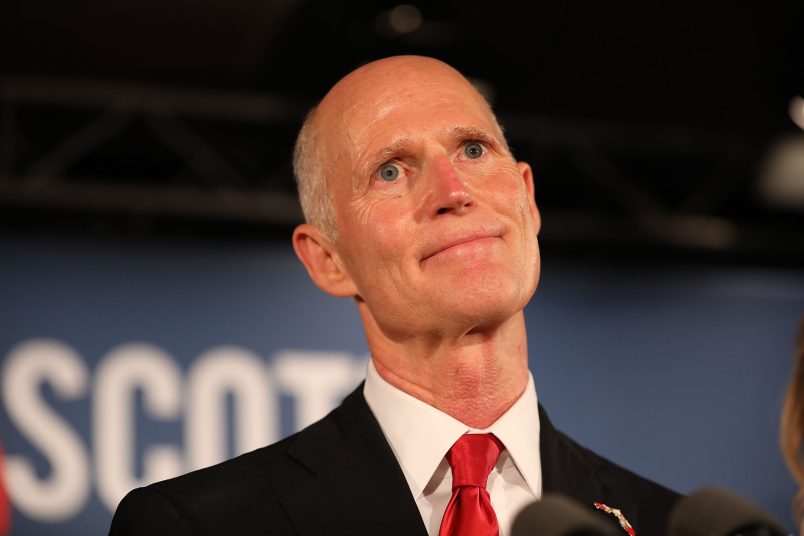Matt Shuham contributed reporting.
Incumbent Sen. Bill Nelson (D-FL) conceded the race to represent Florida in the U.S. Senate to Gov. Rick Scott (R) after a hand recount showed Scott’s victory was final.
“I was not victorious in this race, but I still wish to strongly reaffirm he cause for which we fought: A public office is a public trust,” Nelson said in a video posted to his campaign’s Twitter account.
Well, things turned out a little differently than we had hoped, but I by no means feel defeated. That’s because I’ve had the privilege of serving the people of Florida for most of my life. It’s been a rewarding journey and a very humbling experience. No one could be more blessed. pic.twitter.com/aGIf5nFcyZ
— Nelson for U.S. Senate (@NelsonForSenate) November 18, 2018
“I just spoke with Senator Bill Nelson, who graciously conceded, and I thanked him for his years of public service,” Scott said in a statement shortly after 2 p.m. ET. “This victory would not be possible without the hard work of so many people. Now the campaign truly is behind us, and that’s where we need to leave it.”
President Donald Trump posted a congratulatory tweet:
From day one Rick Scott never wavered. He was a great Governor and will be even a greater Senator in representing the People of Florida. Congratulations to Rick on having waged such a courageous and successful campaign!
— Donald J. Trump (@realDonaldTrump) November 18, 2018
Final official results posted Sunday showed Scott ahead of the three-term incumbent by more than 10,000 votes.
Florida counties had until noon to file official results with the state following a weeklong machine and hand recount that had triggered allegations of fraud and several lawsuits. State officials will certify official results on Tuesday.
Nelson, 76, had no immediate comment, but was scheduled to release a videotaped statement later Sunday.
The apparent defeat of Nelson brings an end to a now-bygone era in Florida. Nelson had been a Democratic survivor as the GOP ascended into power, hewing to a more moderate tone even as newcomers such as Democratic candidate for governor Andrew Gillum tried to push the party in a more liberal direction.
Scott charged into the race last April at the urging of President Donald Trump and spent more than $60 million of his own money on a series of ads that hammered Nelson as out-of-touch and ineffective.
The campaign waged between the two men was more about character, competence and their loyalty to Trump even though Scott was placed on the defensive about his record on the environment and health care.
The weeks leading up to the election were bitter, and it remained that way after it became clear that the race between Nelson and Scott would head to a legally required recount. Scott held a press conference at the governor’s mansion suggesting that fraud may be going on in several Democratic-controlled counties.
Nelson and the Democrats responded by filing several lawsuits that challenged everything from Scott’s authority over the state’s election division to deadlines for mail-in ballots.
The Nelson campaign managed to secure only one win in court. U.S. District Judge Mark Walker gave voters until 5 p.m. on Saturday to fix their ballots if they haven’t been counted because of mismatched signatures. Nearly 5,700 ballots were rejected because signatures on ballot envelopes did not match signatures kept on file by election officials.
Walker rejected a request by Democrats to automatically count all the ballots with mismatched signatures. He also rejected a request to waive deadlines for domestic mail-in ballots even if they had been mailed prior to Election Day.
Scott, a one-time health care executive and multimillionaire, first jumped into politics eight years ago, when he rode a tea party wave into the governor’s office. Term limits prevented him from seeking re-election. As the state’s chief executive, Scott focused on job creation and turning around Florida’s economy after the recession.
Nelson and Scott disagreed on issues ranging from gun control to environmental policy to health care. Nelson was a strong supporter of the federal health care overhaul pushed into law by President Barack Obama, while Scott had called for the law to be repealed and replaced.
Nelson and his allies ran ads that questioned Scott’s ethics, pointing to his ouster as chief executive of health care giant Columbia/HCA amid a federal fraud investigation. Although Scott was never charged with any wrongdoing, the health care conglomerate paid a then-record $1.7 billion fine for Medicare fraud.
Democrats also questioned whether Scott had conflicts while governor since both he and his wife invested in companies that do business in Florida, including a subsidiary of the company that owns Florida’s largest electric utility. Scott has maintained he does not control his holdings.







but not the specter of voter fraud and suppression recurring again and again to infinity.
Or
This is one race that didn’t have to be lost. Even with the suppression.
bookmarking
Conclusion:
The downfall of Florida continues.
2020 will be a whopper of record suppression stories.
Every time I see a picture of this guy, the same question pops into my head …
https://d15zn84cat5tp0.cloudfront.net/wp-content/uploads/2018/11/GettyImages-1064435372-804x536.jpg
Skeletor, or …
Red Skull?
I actually think the resemblance to Red Skull is closer, but I suppose it depends on the angle, time of day, and whether Scott is in Gothic Evil mode or Nazi Evil Mode.